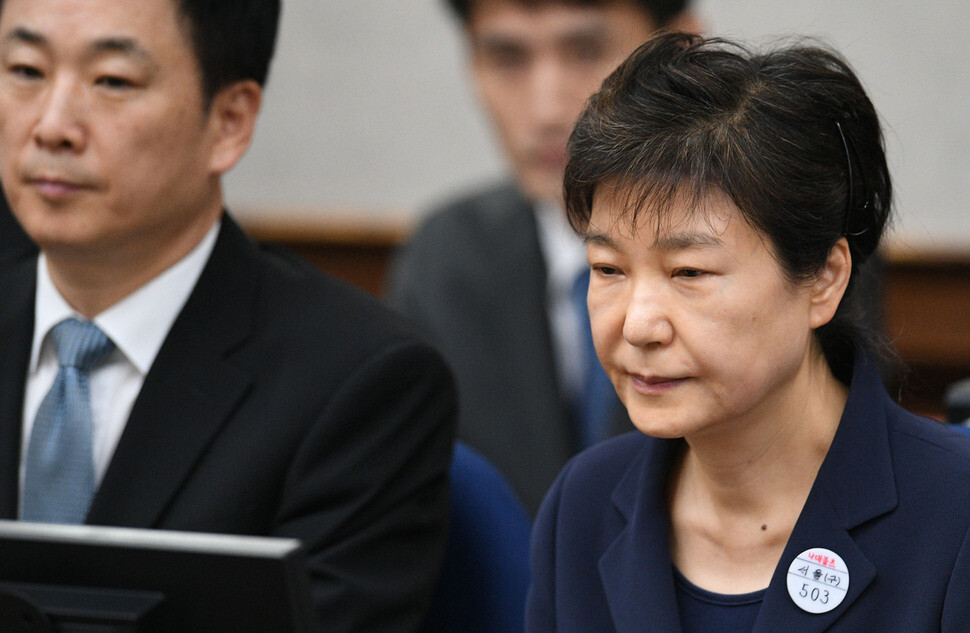hankyoreh
Links to other country sites 다른 나라 사이트 링크
Park accepts prosecutorial depositions for witnesses in corruption trial

Former South Korean president Park Geun-hye, 66, who has been boycotting her trial on charges related to the Choi Sun-sil scandal for three months now, personally gave the court a document retracting her request for witnesses. This makes it likely that the court will not question several chaebol owners, including Kim Seung-yeon, Huh Chang-soo, Koo Bon-moo, Cho Yang-ho and Shin Dong-bin. This move seems to be aimed at wrapping up her current trial and focusing on an upcoming trial in which she is charged with receiving money from the National Intelligence Service’s (NIS) special activity fund.
“The defendant personally submitted an opinion in which she agreed to accept some of the statements submitted by the prosecutors as evidence in the trial,” said Hon. Kim Se-yun, the judge presiding over the 22nd criminal division at the Seoul Central District Court, on Jan. 11, during Park’s trial. The documents that Park accepted are depositions given to the prosecutors by Hanwha Group Chairman Kim Seung-yeon, LG Group Chairman Koo Bon-moo, GS Group Chairman Huh Chang-soo, Hanjin Group Chairman Cho Yang-ho, Lotte Group Chairman Shin Dong-bin, SK Group Chairman Chey Tae-won and So Jin-se Chairman of the Lotte Group’s Corporate Social Responsibility Committee. In a criminal trial, witnesses must testify in court if the defendant refuses to accept their depositions submitted by the prosecutors.
Yu Yeong-ha and the rest of Park’s legal team had refused to accept these depositions as evidence before they resigned en masse on Oct. 16, 2016. The precedent set by the Supreme Court is that when the defendant has appeared in court to reject the admission of evidence, their lawyers cannot later reverse that decision in the defendant’s absence. As a consequence, the court had been planning to summon all of these chaebol heads to testify in person. Provided that the prosecutors withdraw their requests for these witnesses to testify, the chaebol heads will probably not have to testify in court. Park said that the five witnesses requested by her previous legal team do not need to appear in court, either.
This is likely to speed up Park’s current trial. The court’s schedule had run into a snag when various witnesses including Kim Seung-yeon, Koo Bon-moo and Huh Chang-soo who were supposed to testify on Jan. 11 submitted written excuses for their inability to appear in court. Since Park has written off her trial as “political retribution,” she appears determined to quickly bring it to an end and to focus on her upcoming trial about the NIS’s special activity fund.
“Park apparently didn’t see the point of inconveniencing the chaebol heads in her trial since their testimony in the courtroom would probably not be more advantageous to her than their depositions to the prosecutors,” said a senior judge at a district court. When Park declared that she was boycotting the trial in retaliation for the issuance of a second detention warrant on Oct. 16, 2016, she said that she hoped lenience would be shown to the public officials and businesspeople who were appearing in court because of her.
By Hyun So-eun, staff reporter
Please direct questions or comments to [english@hani.co.kr]

Editorial・opinion
![[Column] Park Geun-hye déjà vu in Yoon Suk-yeol [Column] Park Geun-hye déjà vu in Yoon Suk-yeol](https://flexible.img.hani.co.kr/flexible/normal/500/300/imgdb/original/2024/0424/651713945113788.jpg) [Column] Park Geun-hye déjà vu in Yoon Suk-yeol
[Column] Park Geun-hye déjà vu in Yoon Suk-yeol![[Editorial] New weight of N. Korea’s nuclear threats makes dialogue all the more urgent [Editorial] New weight of N. Korea’s nuclear threats makes dialogue all the more urgent](https://flexible.img.hani.co.kr/flexible/normal/500/300/imgdb/original/2024/0424/7317139454662664.jpg) [Editorial] New weight of N. Korea’s nuclear threats makes dialogue all the more urgent
[Editorial] New weight of N. Korea’s nuclear threats makes dialogue all the more urgent- [Guest essay] The real reason Korea’s new right wants to dub Rhee a founding father
- [Column] ‘Choson’: Is it time we start referring to N. Korea in its own terms?
- [Editorial] Japan’s rewriting of history with Korea has gone too far
- [Column] The president’s questionable capacity for dialogue
- [Column] Are chaebol firms just pizza pies for families to divvy up as they please?
- [Column] Has Korea, too, crossed the Rubicon on China?
- [Correspondent’s column] In Japan’s alliance with US, echoes of its past alliances with UK
- [Editorial] Does Yoon think the Korean public is wrong?
Most viewed articles
- 1‘We must say no’: Seoul defense chief on Korean, USFK involvement in hypothetical Taiwan crisis
- 2Will NewJeans end up collateral damage in internal feud at K-pop juggernaut Hybe?
- 3[Column] Park Geun-hye déjà vu in Yoon Suk-yeol
- 4Why Korea shouldn’t welcome Japan’s newly beefed up defense cooperation with US
- 5Thursday to mark start of resignations by senior doctors amid standoff with government
- 6N. Korean hackers breached 10 defense contractors in South for months, police say
- 7[Guest essay] The real reason Korea’s new right wants to dub Rhee a founding father
- 8[Column] ‘Choson’: Is it time we start referring to N. Korea in its own terms?
- 9Kim Jong-un expressed ‘satisfaction’ with nuclear counterstrike drill directed at South
- 10[Editorial] New weight of N. Korea’s nuclear threats makes dialogue all the more urgent